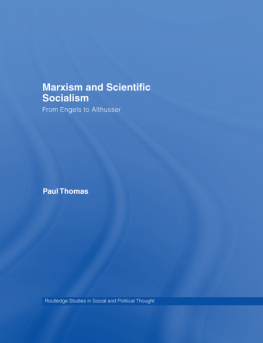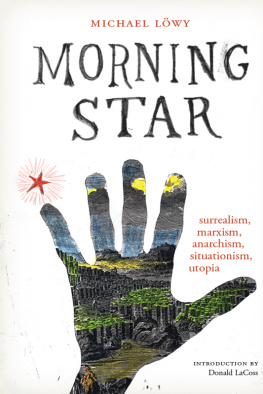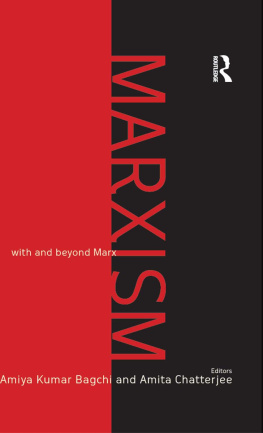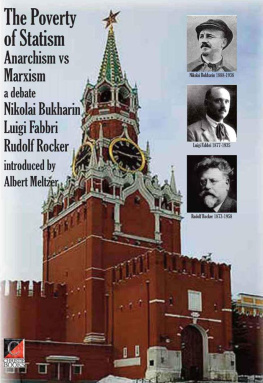Frederick Engels - Marxism and Anarchism
Here you can read online Frederick Engels - Marxism and Anarchism full text of the book (entire story) in english for free. Download pdf and epub, get meaning, cover and reviews about this ebook. publisher: Wellred Books, genre: Politics. Description of the work, (preface) as well as reviews are available. Best literature library LitArk.com created for fans of good reading and offers a wide selection of genres:
Romance novel
Science fiction
Adventure
Detective
Science
History
Home and family
Prose
Art
Politics
Computer
Non-fiction
Religion
Business
Children
Humor
Choose a favorite category and find really read worthwhile books. Enjoy immersion in the world of imagination, feel the emotions of the characters or learn something new for yourself, make an fascinating discovery.
- Book:Marxism and Anarchism
- Author:
- Publisher:Wellred Books
- Genre:
- Rating:4 / 5
- Favourites:Add to favourites
- Your mark:
- 80
- 1
- 2
- 3
- 4
- 5
Marxism and Anarchism: summary, description and annotation
We offer to read an annotation, description, summary or preface (depends on what the author of the book "Marxism and Anarchism" wrote himself). If you haven't found the necessary information about the book — write in the comments, we will try to find it.
Marxism and Anarchism — read online for free the complete book (whole text) full work
Below is the text of the book, divided by pages. System saving the place of the last page read, allows you to conveniently read the book "Marxism and Anarchism" online for free, without having to search again every time where you left off. Put a bookmark, and you can go to the page where you finished reading at any time.
Font size:
Interval:
Bookmark:

Marxism and Anarchism second edition published in April 2015. Including selections by Frederick Engels, V. I. Lenin, Leon Trotsky, Alan Woods, and others.
Copyright Wellred Books. All rights reserved.
Editing and layout for this edition by Wellred Books, based on the 2012 edition layout by Steve Iverson, Josh Lucker and the Editorial Board of Socialist Appeal (www.socialistappeal.org).
Copyright Wellred USA, 2012.
Ebook produced by Martin Swayne. Smashwords edition, published November 2018.
UK distribution:
Wellred Books, wellredbooks.net
PO Box 50525
London
E14 6WG
USA distribution:
Marxist Books, Marxistbooks.com
WR Books
250 44th Street #208
Brooklyn
New York
NY 11232
ISBN: 978 1 900007 88 7
T he present period is the most stormy and convulsive period in history. Globalisation now manifests itself as a global crisis of capitalism. Given the depth of the crisis and the worsening conditions, things are developing very quickly. The stage is set for a general revival of the class struggle, and in fact, this process has already begun.
The most striking manifestation of the changed situation is the emergence of a worldwide protest movement that is rejecting capitalism and all of its works. A growing number of people are reacting against the crying injustice of the existing order: the unemployment that condemns millions to enforced inactivity; the gross inequality, which concentrates obscene wealth and impoverishment for the vast majority of the worlds population; and the endless wars, racism, and restrictions on life, liberty, and the pursuit of happiness.
The top one percent of the USA owns 34.6% of the wealth in total net worth; the next 19% owns 50.5%; the bottom 80% owns only 15%. In financial wealth, the figures are even more startling: 42.7%, 50.3%, and 7.0% respectively. These statistics are from 2007, but the most recent complete data show that the recession has meant a massive drop of 36.1% in median household wealth as compared to 11.1% for the top one percent, further widening the gulf between the obscenely rich and the rest of usthe 99%.
The 200809 recession has meant an even greater increase in inequality: further enrichment for the super-rich and more poverty for the poorest. The revolting spectacle of wealthy bankers walking away from the crisis with billions of dollars of public money while over 10 million mortgages are set to default and the unemployed stand in line for food handouts is stoking the fires of mass indignation.
In normal circumstances most people do not protest. They remain passive spectators of a historic drama that is played out before their eyes, in which they play no part but which determines their lives and fate. But every once in a while, people are shaken out of their apparent apathy by great eventssuch as a war or an economic crisis. They begin to take action, to take an interest in politics and to try to regain control over their lives.
Such moments in history have a name: they are called revolutions. Such was the American Revolution of 1776; the French Revolution of 178993; the revolutionary movements in Europe in 1848; the Paris Commune of 1871; the Russian Revolutions of 1905 and 1917; the Spanish Revolution of 193137; and more recently, the Egyptian and Tunisian Revolutions.
The events that are unfolding before our eyes have many of the features of the early stages of a revolutionary situation. Many people who hitherto took little or no interest in politics now find themselves in the streets protesting and demonstrating against a social and political order that has become intolerable.
There is an old saying: life teaches. This is very true. The workers and students in Tahrir Square learned more in 24 hours of struggle than in twenty years of normal existence. Similarly, the experience of the participants of the Occupy movement in the USA and other countries is being compressed time-wise. It will not take 20 years for them to absorb the lessons. People are learning fast.
Under these conditions, the ideas of libertarianism, anarchism, and socialism are all making a revival, as the youth and workers search for an explanation of the crisis and a road forward. The heroic glory days of the Industrial Workers of the World are being revived in the minds of many young people as they fight to form unions in their minimum-wage workplaces. Anarchist writers such as Proudhon, Kropotkin, Bakunin and Durruti are being rediscovered by new layers of youth. Authors such as Howard Zinn, Michael Albert, and Noam Chomsky, who expose the evils of imperialism and capitalism, are being eagerly read by a new generation.
Insofar as they open peoples eyes as to the undemocratic and exploitative nature of capitalist society, the growing interest in these ideas is extremely positive. Anarchism is appealing to many young people due to its simplicity: to reject anything and everything to do with the status quo. But upon deeper examination, there is a pervasive lack of real substance and depth of analysis in these ideas. Above all, there is very little in the way of an actually viable solution to the crisis of capitalism. After reading their material, one is inevitably left asking: but what is to replace capitalism, and how can we make this a reality, starting from the conditions actually existing today?
It is this authors contention that only the ideas of Marxism can provide a theoretical guide to action that can actually harness the movements energy into the revolutionary transformation of society. Not Stalinismthat bureaucratic, undemocratic, totalitarian caricature of socialism; and not the lifeless, mechanical, deterministic Marxism of the academic worldbut genuine Marxism: the most modern, dynamic, and all-encompassing tools of social analysis yet developed by humanity. Only these ideas can provide not only an analysis, but a revolutionary socialist solution to the crisis facing the world working class.
The publication of this volume marks an important step forward in the theoretical arming of a new generation of class fighters in the US The question of Marxism vs Anarchism has long been discussed. It is no accident that as the class struggle again boils to the surface, the old debates are being revived. Many people newly awakening to political life imagine that they are involved in something entirely new and original; but as the Bible says, there is nothing new under the sun. And although they do not know it, many of these debates have already taken place in the past.
There are many misconceptions about the history, genesis, and real content of both Marxism and anarchism. We can and should learn from the collective experience of our class; from what has worked and what has not worked. This collection of writings will go a long way towards clarifying the Marxist perspective on the limitations of anarchism, and the need for a party, theory, programme, perspectives, organisation, internal democracy, and accountability.
The millions of people who have come out onto the streets and squares of Spain and Greece to oppose the policy of cuts and austerity do not trust the politicians and trade union leaders. And who can blame them? In both Greece and Spain the governments that carried out these attacks were supposed to be socialist. The masses deposited their confidence in them, and found themselves betrayed. They conclude that in order to defend their interests they must not leave things to the politicians but take action themselves.
Font size:
Interval:
Bookmark:
Similar books «Marxism and Anarchism»
Look at similar books to Marxism and Anarchism. We have selected literature similar in name and meaning in the hope of providing readers with more options to find new, interesting, not yet read works.
Discussion, reviews of the book Marxism and Anarchism and just readers' own opinions. Leave your comments, write what you think about the work, its meaning or the main characters. Specify what exactly you liked and what you didn't like, and why you think so.













